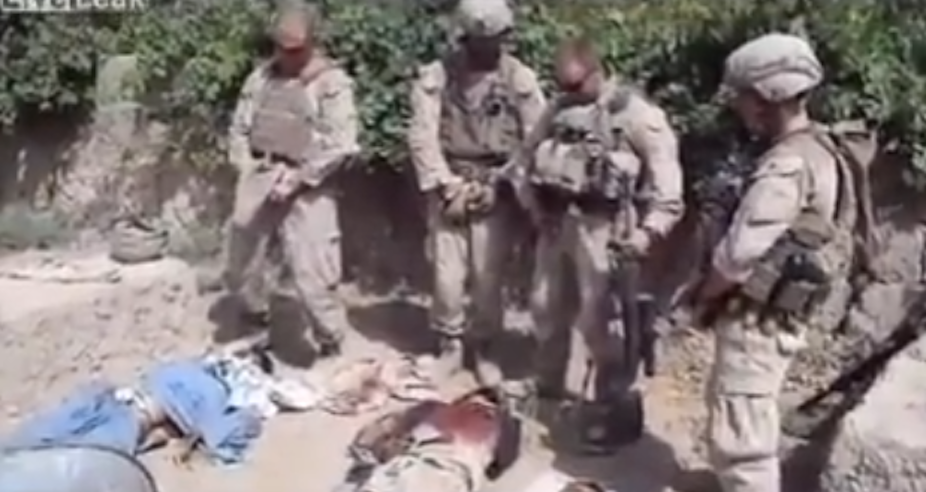A video has emerged (WARNING: graphic content) depicting US Marines urinating on the bodies of dead Taliban fighters.
Afghan President Hamid Karzai had led criticism of the Marines, while US defence secretary Leon Panetta said:
“I have seen the footage, and I find the behaviour depicted in it utterly deplorable. Those found to have engaged in such conduct will be held accountable to the fullest extent.”
The Conversation spoke with military culture expert Ben Wadham about what motivated the Marines to desecrate the bodies and what effect the release of the images may have on the American effort to fight the Taliban insurgency.
Why would the Marines do this? Is this common behaviour in war? Why would they film it?
It is an artefact of military culture that soldiers at different times will engage in the desecration of the bodies of those they have killed. This is an age-old tradition if you like.
It is not common in the sense that every group of soldiers will engage in it but it does happen often enough to be common to be an artefact of military culture.
Australia has its own experience with the killing of militia by the SAS in East Timor in the early 2000s.
Is this a 21st Century Western equivalent of necklaces of ears and the like?
That is right. In Vietnam it was common that Western soldiers would take ears, teeth, digits and of course other ornaments like rings and necklaces and things like that from soldiers [they had killed].
It is something that is consistent with soldiering and it shows a complete breakdown of local leadership and command when it happens.
I don’t think civilian society understands what the mind of the warrior is, what the culture of the warrior is. When you are created as a soldier or a warrior, you are segregated from the rest of civilian society, you see yourself as quite different. There is the Churchill saying: “We sleep safely in our beds because rough men are willing to do violence …”
Soldiers really believe they are a special mob and the way they bring this together is through a notion of brotherhood. Four blokes, four kills, urinating on four Taliban, just works to enhance that sense of brotherhood and establishes the sense of the Americans being above the law and being better than the people they are trying to help.
Do we see more of these atrocities the longer these wars drag on?
That is fair to say. When forces move into a new conflict area they are pretty clear about their objectives, they are clear about the rules of engagement and they are relatively fresh in the way they see the enemy.
As a conflict carries on soldiers question their place there, they question the role they have, they question the mission and they de-humanise the enemy. It is a process of all the experiences that soldiers have in those environments.

There have been a number of experiences of Taliban working for the Australian forces or the Americans and then turning against those soldiers. Those sort of events contribute to a growing disrespect and dehumanisation of the enemy.
What is the difference between this and Abu Ghraib?
There is a distinction there in that one is a combat situation and one is a detention situation. One is a situation where the enemy is still volatile, still has the potential to kill and one is a situation where the enemy is neutralised. They are not combatants.
These particular soldiers in Afghanistan were Marine snipers. They would have been engaging the enemy from a distance. It is not necessarily likely that their lives would have been under immediate threat. In a sense there is a connection to Abu Ghraib and this Marine example.

The soldiers considered the Taliban as a dehumanised object. I don’t think we can say there is a sense of immediate conflict and threat to this to intensify the situation. This is not a heat of the moment decision, it wasn’t hand-to-hand combat.
A sniper kill is a pretty methodical kill and these soldiers have come out to see the kills, they’ve collected the kills and then they have decided to desecrate them by pissing on them and I think that demonstrates that the soldiers have lost any sense of objectivity about the role that they have in Afghanistan.
How does this affect the US counter insurgency strategy?
It is massive. This is an insurgency. Afghanistan is a very diverse cultural environment, there is infighting and conflict between clans and tribes.
When the Americans came in they created elites and distributed resources to some and not to others. There is no sense of the Americans creating a sense of nationalism for the Afghanis.
When Americans come in and do this, it completely undermines their authority, it destroys the sense of respect. This happens with collateral damage - through air and drone strikes and the failed capture-and-kill missions they are engaging in that inadvertently kill civilians - and that is exacerbated when you get soldiers engaging in this degradation of corpses. It shows a complete lack of respect and the Afghani people will become more resistant to this force.

